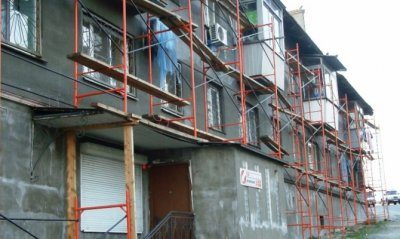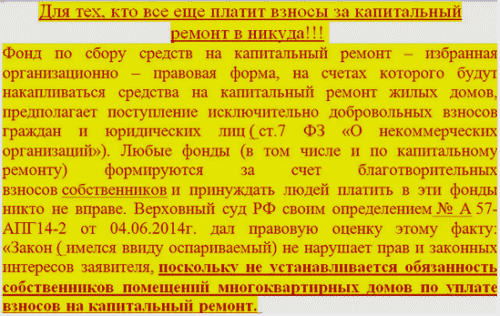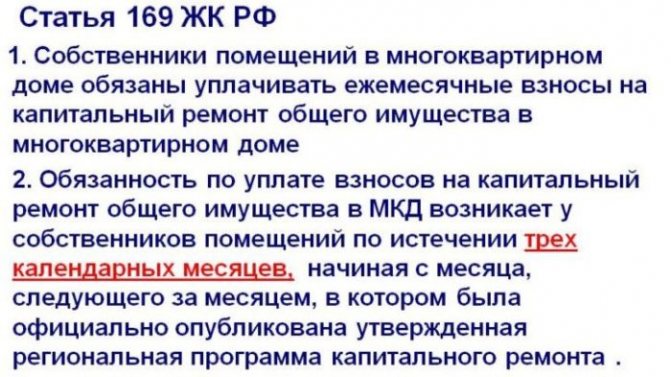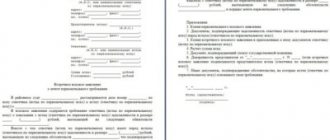Nowadays, a large number of families and individual residents live in rented apartments. This is due to the high cost of housing when purchasing it and the inability of some people to obtain a loan or mortgage. An important issue when choosing a room to rent is the rent. The lease agreement takes into account many nuances, and one of them is whether the tenant must pay for major repairs. The doubt about the validity of this clause in the contract is not accidental. Many people do not share the concepts of utilities, routine repairs and major repairs. To decide whether to agree to sign this condition in the contract, you need to understand the wording and legal justification.
Relevance of the issue
The lease agreement reflects not only the fixed amount of payment for the used square meters to the owner, but also the payment of monthly receipts. Depending on the region, the availability of installed metering devices, the number of people registered in the apartment and the time of year, this payment can amount to a significant amount, which the tenant runs the risk of not being able to repay.
This is interesting! Transparency of the final figure for the monthly payment is one of the main points in choosing an apartment for rent. This raises a reasonable question: what is the tenant obliged to pay for and what is not. This point is relevant both for renters of apartments in municipal buildings and in private ones.
The status of housing does not relieve the owner of the responsibility to pay for utilities and major repairs. Also, responsibility is not removed from him if strangers live in his apartment under an agreement. Now it remains to find out, if the apartment is municipal, who pays for major repairs?
How is the fee calculated?
The amount indicated in receipts sent to addresses may vary. The amount depends on many nuances , the main ones being the age of the house and the presence or absence of an elevator . It is clear that the renovation of Stalin-era buildings and the construction of elevator structures in them will cost much more than the nine-story buildings built at the end of the previous century. The work itself will be carried out in a regular order. Where you place in line depends on the following factors:
- when the house was put into operation;
- how much money has already been collected;
- date of last overhaul.
The transferred contribution should not be less than the denomination established by the state (in the Moscow region it is eight rubles and thirty kopecks), but it can be increased by decision of the meeting of apartment owners. The calculation is carried out in rubles according to the principle: the cost per square meter multiplied by the total area of the home.

If you have any questions, you can consult for free via chat with a lawyer at the bottom of the screen or call by phone (consultation is free), we work around the clock.
+7 (Moscow) +7 (St. Petersburg)
You have successfully subscribed.
Now all new paid questions will be sent to you by email.
You can unsubscribe in your Notification Settings © Yustiva All rights reserved 2017-2019 With the support of online chats Log in as the author of the question to rate the lawyer’s answer and/or add a comment to it. Log in as the author of the question to rate the lawyer's answer and/or add a comment to it.
Time is up
The time allocated for editing has expired.
Thank you!
Our moderator will review your complaint shortly.
Rules and guidelines for writing answers
- It is forbidden to give a useless answer. The consultation must be complete and reasonable.
- It is prohibited to duplicate/copy answers from other lawyers from different sources.
- Your answer must be original and unique.
- It is prohibited to quote laws excessively without explanation.
- It is prohibited to offer your services bypassing the site (indicate contacts).
- It is prohibited to provide links to third-party sites unless absolutely necessary or without a client’s request.
- It is forbidden to be rude to the client
- Greet the client;
- Answer fully and reasonably;
- Give reasons for the indication of the relevant laws;
- Summarize the consultation in a concentrated form.
What is included in utility bills
The Housing Code of the Russian Federation clearly delineates the definitions of mandatory monthly payments. They are divided into utilities and payments for the maintenance of an apartment building and its territory. Utility bills include:
- removal of solid waste (solid waste);
- heating (relevant in winter);
- supply of energy resources - calculated separately in the receipt for each type: electricity, water supply, natural gas;
- Maintenance.

Important! The water supply, in turn, is divided into hot and cold. An additional item is sewerage service. Current repairs mean eliminating minor faults, cleaning the area, and carrying out construction restoration work not related to the redevelopment and reconstruction of the building and the surrounding area.
Additional items included in the monthly rent receipt:
- security, video surveillance system;
- intercom;
- parking space;
- Internet;
- radio point (now almost irrelevant).
These five points above are not specified in the Housing Code of the Russian Federation, therefore they are included in the monthly receipt only by agreement of the parties for the maintenance of the housing stock, between the owner of the property and the management company or HOA. The tenant of the premises pays for these items if they are listed on the receipt and specified in the terms of the lease agreement between the tenant and the owner.
What is meant by major renovation?
This concept is defined as carrying out planned large-scale repairs associated with construction work to radically change the structure of the building, individual premises and communications.
List of works falling under the concept of thorough repairs of common property:
- replacement of communications - includes a complete replacement of pipes in the water supply, sewerage and heating systems, affecting not individual rooms, but the entire system of the house. During such work, not only pipelines are changed, but also heating devices (towel rails, radiators). There is also a replacement of power supply networks, when old wires and circuit breakers are replaced with new ones. The same applies to gas pipes: they can be completely replaced with new ones, including the installation of individual gas boilers in each apartment;
- facade insulation - this work includes a complete change in the facade of an apartment building, which occurs in connection with the insulation of external walls. Penoplex or mineral wool is attached to the surface of the walls, and the top is decorated with a curtain wall or decorative putty/paint;
- window replacement – complete replacement of old window frames with new ones;
- modernization of elevator shafts and cabins - includes a complete overhaul of the elevator shaft and replacement of the elevator cabin;
- reconstruction of premises - includes work with the manipulation of load-bearing structures of an apartment building, such as extensions of new floors, extensions of balconies, redevelopment of residential premises and when it is necessary to repair a large area;
- planning of the local area - includes ground work, cutting down trees, clearing the site, pouring concrete and organizing parking spaces.

As can be seen from the list, major repairs include a list of works that are inseparable improvements. Contributions for major repairs are not included in the housing and communal services payment accounts, which would oblige the tenant to pay them monthly according to receipts.
Who should pay for it
The tenant must pay only regular utility bills and minor routine repairs - these are his responsibilities. In fact, payment occurs for the tenant’s direct use of energy resources and services provided by the management company. The homeowner is required to independently pay for the costs associated with major repairs. This is regulated by the Housing Code of the Russian Federation. Property in an apartment building that has been modernized under the concept of a major overhaul is an inseparable improvement, which means it was carried out taking into account the interests of the property owner, because the tenants of the premises may change.
Often this issue becomes a stumbling block in concluding a lease agreement, because the owner does not understand why he should pay for repairs if he does not actually live there, and the tenant does not understand why these costs fall on him if he is not the owner and can for various reasons to move out of the apartment at any time.
It is important to know! The next article of the Housing Code states that utilities are paid by the tenant. If the apartment is rented, then he is obliged to pay the full amount indicated on the receipt. The rule “if I want to cry, but if I want to, I don’t” will not work here. The law stipulates that tenants will definitely pay the owner and management company for the energy resources used, although this may require a court decision if it comes to that.
Question in light of legislation
You won’t be able to think about anything at all—not a single room will be provided free of charge. So, at a minimum, you will have to pay for the apartment and keep the common property in order (Article 678 of the Civil Code of the Russian Federation). Responsibilities of the tenant of residential premises The tenant is obliged to use the residential premises only for living, ensure the safety of the residential premises and maintain it in proper condition. The tenant does not have the right to carry out reconstruction and reconstruction of residential premises without the consent of the landlord. The tenant is obliged to pay rent for the premises on time. Unless otherwise specified in the contract, the tenant is obliged to make utility payments independently. Do I have to pay for major repairs if the apartment is not privatized? According to the current law, whoever owns the home pays for it (Article 158; 169 of the Housing Code of the Russian Federation).
Should tenants pay for major repairs? If the apartment is not the property of a person, that is, he either rents it or lives under a social tenancy agreement, the payment for major repairs of a municipal apartment falls either on the municipality or on the landlord. If such receipts arrive at the address where a commercial tenant lives, they must be handed over to the owner of the premises. If you have any questions, you can consult for free via chat with a lawyer at the bottom of the screen or call by phone (consultation is free), we work around the clock.
Moreover, according to current standards,
contributions must be paid for everything - both inhabited and non-residential premises of the building included in the overhaul program.
How to resolve the issue
Such things should be discussed in advance by the parties “onshore”. This issue may not arise at all if no one takes a stand. Sometimes it is not difficult for either the owner or the tenant to repay the payment. The problem comes when both refuse to do this. It is important to remember here that the law is on the tenant’s side, so he has the right to insist on his own to the end. Payment for the modernization of common property in an apartment building should not fall on his shoulders, unless the tenants themselves agree to this condition - to pay for major repairs. If a popular explanation of one’s rights and a firm refusal to sign an agreement with this clause do not affect the owner, then it is worth looking for another housing where the landlord will be guided by the law, and not by his own desire, to make money on rent and save on repairs.
Why save for major repairs?
The authorities do not have obligations to finance major repairs of structural elements and utilities of single-family houses. Material costs for these purposes are borne by the owner of the house, who is also a taxpayer. In order to achieve so-called social justice, similar expenses are now borne by law by the owners of residential and non-residential premises in an apartment building.
If you have any questions, you can consult for free via chat with a lawyer at the bottom of the screen or call by phone (consultation is free), we work around the clock.
Of course, if you do not collect and accumulate money for the overhaul of an apartment building, important repair work will not be carried out and the building will go into emergency status, threatening the health and lives of the citizens living in it. In this entire financial process, it is important to note that it is cumulative in nature and increases the value of real estate and, as a result, the potential income of the owner.
Who by law must accumulate money for major repairs?
Many people, having received a payment slip for the payment of contributions for major repairs, wonder about the legality of the payment. This is due to constant changes in housing legislation in this area. Citizens simply do not have time to adapt to innovations and thus experience great difficulties in interpreting laws and a huge amount of by-law documentation. According to Article 169 of the Housing Code of the Russian Federation, the owners of apartments and non-residential premises must pay contributions for major repairs of the house, but it is no secret that not all property owners use it for its intended purpose. Some rent out premises, receiving income from it according to the contract or simply fulfilling their social obligations. This is where various kinds of misunderstandings often occur. Should the tenant pay for major repairs in this case? It should be clearly understood that residents of apartments, according to a lease or rental agreement, including social rent, as well as those who rent non-residential premises, are not required to pay for major repairs. Therefore, payments received in the name of the tenant or tenant should be immediately forwarded to the owner.










